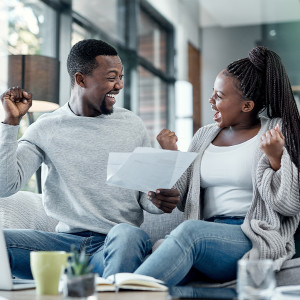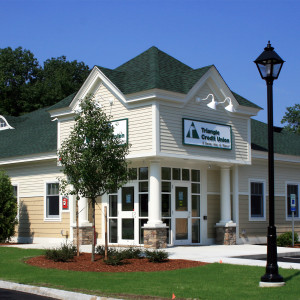Episodes

Tuesday Sep 20, 2022
Can You Answer These 5 Financial Questions? - Money Tip Tuesday
Tuesday Sep 20, 2022
Tuesday Sep 20, 2022
How much do you know about some basic finance terms and concepts? Test your knowledge with this Money Tip Tuesday financial quiz.
Links:
Learn more about APR
Listen to our Calculating Your Net Worth Money Tip Tuesday episode
Freddie Mac information about credit scores
Podcast episodes on credit:
What the Heck is Credit and Why is it Important?
Strategies to Build Your Credit
Listen to our Starting Your Emergency Fund Money Tip Tuesday episode
Follow our podcast Facebook, Instagram and Twitter
Transcript:
Welcome to Money Tip Tuesday from the Making Money Personal podcast.
How much do you know about some basic finance terms and concepts? Test your knowledge with this Money Tip Tuesday financial quiz.
Think you’re up for the challenge? Give it a shot and see how well you do!
Good luck and let’s begin!
Question 1: What does APR stand for?
APR stands for Annual Percentage Rate.
Investopedia defines APR as “the yearly interest generated by a sum that's charged to borrowers or paid to investors.” If you borrow money from a lender, you’ll be charged interest on your payments. The APR tells you the percentage rate that you can expect to pay over a one-year period. In many types of loans, the rate and the APR are the same, but other times they can differ due to additional fees or charges associated with the loan.
Next time you’re rate shopping, take note of not only the interest rate you’ll pay, but that APR as well.
Question 2: Net worth is calculated by subtracting your debts from your what?
Net worth is calculated by subtracting all your debts (or liabilities) from your assets.
Assets are things you own that have value. Things like investments, cash and savings accounts, collectibles and jewelry are considered assets. On the flip side, your debts are everything that you owe money on. Things like your mortgage, auto loan, and credit card balances are all considered debts. When you calculate your net worth, you subtract the total number of your debts from the total number of your assets.
If you’re interested in learning more about how to calculate your net worth, we have a Money Tip Tuesday episode that walks you through the steps on how to do it.
Question 3: If you want a healthy credit score, you should keep your debt to credit ratio below what percentage? A) 80% B) 30% C) 50%
Answer: B) 30%
Your debt to credit ratio is used to describe how close you come to reaching your credit limit. A 100% debt to credit ratio means you’ve borrowed 100% of your credit line and essentially maxed out your card. This does not look good for your credit.
If you want to maintain a healthy credit score, you should aim to keep your debt to credit ratio at 30% or below. For example, if you have a $10,000 credit limit, you should be keeping your charges at or below the $3,000 amount.
Question 4: What are the 5 main factors that add up to make your credit score?
According to Freddi Mac, the main factors are: Payment History, Amounts you Owe, Length of Credit History, Credit Inquiries, and Types of Credit You Use.
These are all factors used to determine your credit score. Each carries a different weight so some are more important than others.
If you’re trying to find ways to boost your credit score you can look at these factors. Pay attention to each one and how they can affect your personal credit history.
For more information about credit, you can listen to our prior episodes, What the Heck is Credit, and Strategies to Build Credit.
Question 5: How many months' worth should you have saved in an account for a healthy emergency fund? A) 1-2 B) 10-12 C) 3-6
Answer: C) 3-6 months
Your emergency fund is an account of money that you have set aside for emergency purchases. You should aim to have 3-6 months’ worth of expenses set aside in this account in case something happens. For example, if your living expenses are around $5,000 a month, a healthy emergency fund would have $15,000 – $30,000 saved in it.
Having an emergency fund is an important financial goal to meet because it provides a lot of flexibility and assurance if life brings about unexpected challenges.
If you don’t have an emergency fund yet, it’s a good idea to start one. If you can’t save the full 3-6 months right away, don’t worry. Just start saving something and make that 3-6 months your next financial goal to meet.
This wraps up our quick financial quiz.
How did you do? Let us know on social media!
If there are any other tips or topics you would like us to cover, let us know at tcupodcast@trianglecu.org. Like and follow our Making Money Personal FB, IG and Twitter pages and look for our sponsor, Triangle Credit Union on social media to share your thoughts.
Thanks for listening to today’s Money Tip Tuesday and be sure to check out our other tips and episodes on the Making Money Personal podcast.
Have a great day!

Tuesday Sep 13, 2022
Fraud Prevention for Phone Scams - Money Tip Tuesday
Tuesday Sep 13, 2022
Tuesday Sep 13, 2022
Dangerous fraud scams are all around us. In fact, they are getting more sophisticated and convincing by the day. If you get suspicious phone calls from your bank, stay calm and don’t panic, because you just might be getting scammed.
Links:
If you believe you've been scammed, you can report it right away to the authorities. Visit usa.gov for more information.
Did you know? Triangle's Better Checking account offers ID Protection that monitors your identity for fraud.
Follow our podcast Facebook, Instagram and Twitter
Transcript:
Welcome to Money Tip Tuesday from the Making Money Personal podcast.
Scammers are using more sophisticated technological tricks to get you to hand over your sensitive information.
Some latest scams appear to be convincingly from trusted financial institutions.
Here’s a story about someone who recently faced a scammer claiming to be from their bank. Let’s call this person Jack.
One day Jack received a phone call.
The caller claimed to be from Jack’s bank and the caller ID even showed the bank phone number.
The caller said they were from the fraud department and was calling about Jack’s debit card ending in... and rattled off the correct last four digits of Jack’s debit card.
The caller then asked if Jack had been traveling recently and then stated that there were reports of suspicious card activity in some out of state stores.
Jack is a little alarmed and stays on the line to find out more.
He confirmed he didn’t make any purchases at those stores and the caller then said they could get him a new card if Jack could confirm his address and phone number.
Then the caller reads off Jack’s correct home address and phone number, and even sends a verification code to Jack’s cell phone.
Then the caller asks for Jack’s PIN to deactivate the debit card.
This set off a red flag and Jack refuses to give out his PIN.
The caller pushes back by pointing out that the caller ID number matches the service phone number on the back of Jack’s card.
But, because things seemed too suspicious and Jack didn’t trust the caller, he said he would hang up and call the bank back himself.
At this point, the caller abruptly hung up the phone, further confirming Jack’s suspicion that the call was a scam.
Calls like these can happen to anyone. To keep your information secure you must remain on guard and aware of the threats. Question everything and brush up on your bank’s communication policies. Many will provide a list of things they will never ask you for over the phone, or in any email or text message.
Here are a few key identifiers for fraudulent messages to keep in mind in case you ever come across a scam like this.
Usually if the message has an urgency to it, it’s fake. Messages that alarm you and then immediately ask you to act prey on your emotions and get you to impulsively hand over all kinds of sensitive information without stopping to think about it.
If the message asks for you to provide sensitive information like login information, PINs, social security numbers and bank accounts it’s most likely a scam.
If the message is offering you a special prize or tells you you’ve won a lottery or sweepstakes and then it requires you to pay a fee to get it, it’s a scam.
Stay on guard with every message, be it a phone call, text or email. Scammers can be very convincing so make sure you stay aware of their tactics so you can keep your personal information safe.
If there are any other tips or topics you would like us to cover, let us know at tcupodcast@trianglecu.org. Like and follow our Making Money Personal FB and IG page and look for our sponsor, Triangle Credit Union on social media to share your thoughts.
Thanks for listening to today’s Money Tip Tuesday and be sure to check out our other tips and episodes on the Making Money Personal podcast.
Have a great day!

Tuesday Sep 06, 2022
The True Cost of Purchasing a Car - Money Tip Tuesday
Tuesday Sep 06, 2022
Tuesday Sep 06, 2022
You just passed your driving test and you’re ready to hit the open road with new wheels. Before you start looking for your first car, you need to consider all the costs of auto ownership.
Links:
Visit Car Max, Car Gurus, AutoTrader to search for cars
Try using Triangle's AutoSmart tool to find your next car
Check out Triangle's current vehicle rates
Follow our podcast Facebook, Instagram and Twitter
Transcript:
Welcome to Money Tip Tuesday from the Making Money Personal podcast.
New drivers are excited about the newfound freedom that comes with a drivers’ license, but to really experience true liberation you have to have your own vehicle. We just went through an auto purchase with my 18-year-old daughter who needed a car for college. Here’s what we found out: the sticker price is only the beginning.
Once you know your budget, you can do online searches through third-party apps like CarMax, CarGuru, AutoTrader—the list goes on and on. I would tell you it’s a quick search, but it’s not. We spent weeks searching for the right vehicle online. I knew the make and model of the car we were looking for and, with some online searching, I soon realized my budget was unrealistic unless I wanted an older vehicle or one with a lot of miles.
When I mentioned that the search results were producing vehicles from three states away, my older daughter suggested I look at some used car lots in a town nearby—this area is notorious for small used car dealerships. I knew I didn’t want to drive 5 hours to look at a car I might not buy, so I searched used car dealerships in that town. This search produced a list of eight used car dealerships. At this point, I just went to each dealerships’ website to see what they had for inventory.
We found the perfect car and made an appointment to look at it. The following day we arrived after school and were notified the car had already been sold. While we disappointed, we were optimistic we could find a good car with this dealer. My daughter and I were invited to walk the lot to see if there was another vehicle that would be a good fit for her. We found it and took it for a test drive!
Now here’s where it gets interesting. The sticker price for the car was $8,500. The dealership fee (which is a fee the dealership must pay to our state is $250) so now the price is $8,750. I have purchased three cars within the past two years and every dealership, no matter the size, must comply with this fee, which means it’s passed on to you, the consumer. If you buy from a private seller, you shouldn’t have this additional cost.
Before we left the lot, we added insurance on the car. I made a quick call to my insurance company, which is national insurance provider, and added the car to my policy. There was an immediate payment due of $224, which is part of the prorated premium for the current insurance period.
The next step is to register your car. This is a trip to the DMV, which I would pay $1000 for someone to do for me; actually, that’s an exaggeration, I would pay someone at least $100. In any case, you don’t have to pay anyone to go to your local DMV, but you do need to register your car. The cost of registration varies and is based upon the age and weight of your vehicle. I’m not aware of the actual formula, but for my daughters 2016 Nissan Versa sedan the registration cost for state and city was $180. For newer, heavier vehicles, like a 2022 pickup, the registration costs will be much higher.
You will also need to have your car inspected, which is about $50 depending on where you live and where you have your inspections done. If you’re buying a car from a dealer, the dealership will do the inspection, so the vehicle has an updated inspection sticker.
OK, so let’s add up our numbers: price of car ($8,500), plus dealership fee ($250), plus insurance ($224), plus registration ($180), plus inspection ($50) is $9,204. Since my daughter’s car had the inspection sticker, the true cost of purchasing her car was $9,154 -- $654 above the sticker price. This may or may not be important, depending upon your income or budget, but these costs are something to remember and consider before you purchase that first car.That’s today’s Money Tip. If you have any other tips that could be helpful to other listeners, let us know at tcupodcast@trianglecu.org. Be sure to check out our other tips and episodes on the Making Money Personal podcast and follow us on Facebook and Instagram.
Thank you to our sponsor, Triangle Credit Union, and thanks for listening.
Have a great day everyone!

Tuesday Aug 30, 2022
Tips to Saving Money while in College - Money Tip Tuesday
Tuesday Aug 30, 2022
Tuesday Aug 30, 2022
Paying for college is expensive, from tuition to housing to room and board. On top of all that, there are other things you are going to need to buy plus you will want to have some money to have fun. Here are some tips to save money while in college.
Links:
Check out the education discount for Apple products
Learn more about Spotify student discount offers
Follow our podcast Facebook, Instagram and Twitter
Welcome to Money Tip Tuesday from the Making Money Personal podcast.
Food is one thing that you should be thinking about when it comes to saving money. While at college, you’re definitely going to want to skip the cafeteria and either go out to eat or make your own food at some point. If you plan on making your own food, you’re going to have to go grocery shopping. Before going grocery shopping, make a list of everything you need, and stick with the list. If you go into the grocery store without a plan, you’ll probably leave with more food than you really need. Try to stick to your list and don’t overspend.
When buying food, look to see if the grocery store has any deals going on. There’s usually tons of options for the same item, so find the best price for what you want. Usually store brand foods are cheaper than name brand.
Always check the expiration date. If you don’t think you can finish it before then, find one with a later date. Throwing out expired food is like throwing out money.
Another way to save money at college is to go thrift shopping. Thrifting is a great way to find name brand clothing for a cheap price. You can also find movies, games, dishes, furniture, and even textbooks at a thrift store, all for a lower price than if you bought them new.
You can also save money on gas by carpooling with friends. This will definitely save you a lot of money if you don’t have a car, because now you don’t have to buy one and its cheaper than hiring an Uber every time you need to go out. Instead plan a day with your friends when you can all go shopping together. It’s gas efficient and fun!
Utilize your student discount. A lot of places offer a student discount, and it can save you a lot of money in the long run. Big name brands like Apple will offer a discounted price on computers. Spotify premium offers a student discount that includes Hulu and Showtime. Anything from seeing a movie to buying clothing, you may be able to get a discount on if you ask and show your student ID.
If there are any other tips or topics you’d like us to cover, let us know at tcupodcast@trianglecu.org and don't forget to like and follow our Making Money Personal Facebook and Instagram pages and look for our sponsor, Triangle Credit Union on Instagram and LinkedIn to share your thoughts.
Thanks for listening to today’s Money Tip Tuesday and be sure to check out our other tips and episodes on the Making Money Personal podcast.
Have a great day!

Thursday Aug 25, 2022
Episode 48: Why You Need a Business Exit Plan with Eric Cooper
Thursday Aug 25, 2022
Thursday Aug 25, 2022
Moving through stages of life can be confusing and stressful and it can be especially stressful if you don't have a plan in place for when transitions occur.
In this episode, we talk with Eric Cooper financial planner and certified Exit Planning Advisor about why it's important to have a financial exit strategy when you make any move in life or business.
Links:
Learn more about Triangle Financial Group
Contact Eric about Business Exit Planning
Check out the books Start with Why and Find Your Why by Simon Sinek
Learn more about Triangle Business Solutions
Follow our podcast Facebook, Instagram and Twitter
View episode transcript.

Tuesday Aug 23, 2022
Simple Ways to Pay Down Debt Faster - Money Tip Tuesday
Tuesday Aug 23, 2022
Tuesday Aug 23, 2022
How would you like to be debt free sooner, or at least lower your existing debt to ease up on some financial stress? It’s time to take some simple steps that will help you pay down your debt faster and reach financial freedom sooner.
Links:
Learn more about using a personal loan for debt consolidation
Check out the current rates for various loans and contact Triangle if you have questions about refinancing
Learn more about Triangle's Money Management tool for getting out of debt
Total Money Makeover by Dave Ramsey
Get the Hell out of Debt by Erin Skye Kelley
Money Rules by Jean Chatzsky
Follow our podcast Facebook, Instagram and Twitter
Transcript:
Welcome to Money Tip Tuesday from the Making Money Personal podcast.
If you’re tired of feeling buried in debt and want to start making moves to get out of it there are steps to take that will get you debt free sooner than you think.
First, you can make extra payments towards your debt. Next time you pay your bill, try adding a little more to that payment. Round it up to the nearest $50 or maybe $100 or whatever you can afford. If you do this consistently over time, you’ll be able to shave months, and maybe years, off your loan. You could also try to pay more frequently, like twice a month. Keep in mind though, that before doing this, check with the lender to verify there are no penalties for making extra payments.
Second, if you can, consolidate multiple debts into one using a debt consolidation personal loan. This will help you stay organized by combining your debt into a single, easy payment. Plus, a debt consolidation personal loan will most likely offer you a lower interest rate than what you’re already paying.
Third, you can refinance your loan. Refinancing will allow you to do one of two things. You can refinance the loan for a shorter term, which means you’ll pay it off earlier, or you can refinance at the same term, but for a lower rate. If you choose to go with a lower rate, you can then throw the extra money you have towards the new bill as an extra payment towards principle.
Fourth, you can adjust your spending habits to better manage cash flow. By keeping your expenses lower you’ll be able to free up cash to put towards extra loan payments. You can try freezing your credit card spending, rebalance your budget to cut out unnecessary expenses and renegotiate certain bills like insurance and others to see if you can lower any of those costs.
Fifth, get inspired and organized by using an app or other tool. Do an internet search for debt management apps that keep all your information organized and offer strategies and plans to stay on track. Triangle also has a useful Money Manager tool within your online and mobile banking account that you can start using to set goals on getting out of debt. If you’re a reader, check out some top-rated books for more tips and inspiration on getting out of debt like Total Money Makeover by Dave Ramsey, Get the Hell out of Debt by Erin Skye Kelley, and Money Rules by Jean Chatzsky. Explore other resources like videos and podcasts if you’re looking for more inspiration.
Getting out of debt is a journey. It requires focus, discipline and effort. But if you’re motivated to be debt free, or at least reduce the burden that you’re carrying, making these efforts can fast track you towards that goal.
If there are any other tips or topics you’d like us to cover, let us know at tcupodcast@trianglecu.org and don't forget to like and follow our Making Money Personal Facebook and Instagram pages and look for our sponsor, Triangle Credit Union on Instagram and LinkedIn to share your thoughts.
Thanks for listening to today’s Money Tip Tuesday and be sure to check out our other tips and episodes on the Making Money Personal podcast.
Have a great day!

Tuesday Aug 16, 2022
Cybersecurity for Small Businesses - Money Tip Tuesday
Tuesday Aug 16, 2022
Tuesday Aug 16, 2022
Cyber-attacks are becoming more and more frequent in today’s digital age. However, according to a survey by CNBC and SurveyMonkey, most small businesses aren’t ready. Here are some tips to up the cybersecurity for your small business.
Links:
For other small business resources visit trianglecu.org
Learn more about KnowBe4 and their fraud prevention services
Follow our podcast Facebook, Instagram and Twitter
Transcript:
Welcome to Money Tip Tuesday from the Making Money Personal podcast.
Why does cybersecurity matter? According to the U.S. Small Business Administration, “Cyberattacks cost the U.S. economy billions of dollars a year and pose a threat for individuals and organizations.” Small businesses can be easy targets for cybercriminals, as they don’t have the security infrastructure that larger businesses do. Small businesses are actually three times more likely to be attacked than larger businesses. Another reason that cybersecurity matters to your business is that according to the CNBC and SurveyMonkey poll, 55% of people in the U.S. say they would be less likely to continue doing business with a brand after a cyber-attack. So not only will the cybercriminals steal your data, they will also steal your business away.
Less than half of small businesses have strengthened their passwords, have multi-factor authentication, backed up their data on an external hard drive and have an anti-virus or malware software installed. This leaves their business open for attack, and with no protection, cybercriminals have easy access to their data. Strengthening your passwords and enabling multi-factor authentication is a quick and free step to start protecting your business. Remember, strong passwords shouldn’t be easy to guess. The more complex the password is, the better. Having multi-factor authentication in place also makes it more difficult for cybercriminals to gain access as it adds an extra layer of protection to your password.
Backing up your data on an external hard drive is important – if the cybercriminals get into your data and decide to erase all of it you still have an extra copy. Having an anti-virus program installed will help protect against malware and viruses and can also help remove them from your computer if it does become infected. Always make sure that your anti-virus program is up to date. It would probably be a good idea to turn automatic updates on.
If you have employees, you should train them on internet usage best practices. Employees and their communication is one of the leading causes of data breaches for small businesses. Show them how to spot phishing emails, safe internet browsing practices, avoid downloading anything suspicious, and to protect sensitive information. Some cybersecurity companies like Knowbe4 offers security awareness training and simulated phishing attacks.
It is important to keep your internet connection safe as well. Always encrypt information and use a firewall on your network. If you are using Wi-Fi, add a password to it. You can also set up your router, so it doesn’t broadcast the network name.
If your small business has been compromised, it’s important to contain the damage. Figure out what has been compromised. If there’s any malware, run your anti-virus program to remove it. If any passwords have been compromised, change them immediately. You then need to inform your employees, customers, and vendors about the breach. Being transparent is important, if you try and hide it, their data may be at risk as well. If necessary, get legal advice from a lawyer that specializes in Internet law.
If there are any other tips or topics you’d like us to cover, let us know at tcupodcast@trianglecu.org and don't forget to like and follow our Making Money Personal Facebook and Instagram pages and look for our sponsor, Triangle Credit Union on Instagram and LinkedIn to share your thoughts.
Thanks for listening to today’s Money Tip Tuesday and be sure to check out our other tips and episodes on the Making Money Personal podcast.
Have a great day!

Tuesday Aug 09, 2022
The Benefits of Banking with a Credit Union - Money Tip Tuesday
Tuesday Aug 09, 2022
Tuesday Aug 09, 2022
How often do you think about the companies you do business with, particularly your financial institution? You’ve probably known there is a difference between a bank and a credit union, but do you really know the benefits a credit union can offer you?
Links:
Learn more about Triangle Credit Union
Visit the Credit Union National Association website
Follow our podcast Facebook, Instagram and Twitter
Transcript:
Welcome to Money Tip Tuesday from the Making Money Personal podcast.
When it comes to banking, most people want a place where they feel their money is secure, and they’ll have access to it whenever they need it. Today, credit unions are rising in popularity due to their unique ability to provide great products coupled with personalized services.
Your financial institution is more than where you have your checking account. It’s a pivotal part of your financial plan.
Why wouldn’t you want your financial institution to be your ally? To be a place you can trust with not only your money, but your financial future?
If you’re listening to this, you’re likely already a credit union member. If you’re not yet, you should seriously consider banking with one.
Here are some of the top benefits of banking with a credit union.
The first benefit is that credit unions offer lower loan rates than big banks. Lower rates mean lower payments and credit unions offer lower rates for auto loans, personal loans, mortgages and more. If you’re looking for a way to lower your monthly payments on your loans, consider refinancing with a credit union to free up some cash flow. The other side of this benefit is that credit unions also offer higher deposit rates, so you can earn more interest on your deposits.
Another benefit is that credit unions don’t charge as many fees. Credit unions are not-for-profit institutions, and they also enjoy certain tax breaks that enable them to put more of the money they make back into their products and services. Because of this, credit unions don’t have to charge hefty fees for accounts and other penalties. Common fees you’d see at a bank like annual account fees, overdraft fees and transaction fees tend to be significantly lower at a credit union if they’re even there at all.
Perhaps the most unique benefit of banking at a credit union is that you’re a part owner of the institution. Unlike banks, who have customers, credit unions have members (shareholders). Every member owns a part share in the institution and the credit union focuses on keeping those members satisfied. Joining a credit union is a great way to become a part of the institution instead of feeling like just a number. You also get certain opportunities to participate in institutional changes and vote to elect Board members. Try doing that at a big bank!
Another benefit is that credit unions provide local servicing. If you’re intentional about keeping your money local, you can’t get more local than a credit union. One of the best features of credit unions is that your funds actually help other members in the community. When you deposit money into an account, that money is combined with other members’ funds which are then used to lend to other members who need them. It’s a great way to be a contributing part of your community and to help others who need it. Local service is better service because you’ll build relationships with people who care about you and that relationship gives you the ability to work with the institution if you need help or assistance with any of your accounts or loan payments.
Credit unions are known for their community involvement. They are highly focused on giving back to their communities. It’s a cornerstone of their philosophy regarding service. They work to improve their communities, make regular donations to nonprofits, and support local events. The Credit Union National Association also known as CUNA shares on their website that, “From the biggest cities to the smallest towns, credit unions put our members ahead of the bottom line to promote financial well-being and advance the communities we serve.” Next time you visit a community or non-profit event, odds are you’ll see a local credit union there as a proud sponsor.
So, if you’re a credit union member, we’re happy to have you join us in our mission to provide quality, local service to others. If you’re not, consider joining one. The benefits are worth the effort.
If there are any other tips or topics you would like us to cover, let us know at tcupodcast@trianglecu.org and don't forget to like and follow our Making Money Personal FB page and look for our sponsor, Triangle Credit Union on Instagram and LinkedIn to share your thoughts.
Thanks for listening to today’s Money Tip Tuesday and be sure to check out our other tips and episodes on the Making Money Personal podcast.
Have a great day!

Tuesday Aug 02, 2022
Top Items for Your College Shopping List - Money Tip Tuesday
Tuesday Aug 02, 2022
Tuesday Aug 02, 2022
College is right around the corner for incoming college Freshmen. You might be wondering what you should be buying to bring with you. Here are the top items that should be on your college shopping list.
Links:
Learn more about Apple.com student discounts
Follow our podcast page on Facebook, Instagram and Twitter
Learn more about Triangle Credit Union at trianglecu.org
Contact us with questions or ideas at tcupodcast@trianglecu.org
Transcript:
Welcome to Money Tip Tuesday from the Making Money Personal podcast.
First on your list are basic toiletries. Things like toothpaste, toothbrush, deodorant, soap, shampoo, and in some cases, toilet paper! While I didn’t experience this at college, I have heard that some college bathrooms run out of toilet paper so it’s important to have your own supply—particularly if you sharing a suite, which means a shared bathroom. If you’re living in a college dorm and are sharing a bathroom, you will also want to buy a shower caddy to hold all of your toiletries. This way you can easily bring them in and out of the bathroom and not have to worry about others using your stuff. You will also want to bring a pair of shower shoes (aka, flip-flops) because you shouldn’t walk barefoot in a shared bathroom. And don’t forget your towels!
Next, prepare yourself for those days when you just don’t feel like yourself. Make sure you have cold or allergy medicine, cough drops, ibuprofen, antacids, tissues, and any prescription medications. If you’re a college student who isn’t living close to home, ask your doctor for a 3-month prescription so you can pick up your meds in advance.
Third, your bedding is your nest, and you want to be comfortable. Before you move in, figure out how big your bed is—most dorm beds are extra-long twins so make sure you buy extra-long twin sheets. Don't forget blankets, a mattress cover, a mattress pad, your favorite pillow and maybe a bed wedge pillow so you can do your study on your bed.
Fourth, your college clothes. Make sure you consider the climate and changes in climate for the area you’ll be in. If your college is in a warm climate, you probably don’t need to bring your winter jacket and snow boots. In addition to your clothes, you will need laundry detergent or pods to keep them clean.
Fifth, don’t forget your laptop and other electronics. You will need a laptop to write your papers, take notes, send emails, do your projects, submit your assignments, take your exams, and even go to class if its hybrid. If you don’t have a laptop, check out Apple for a student discount. If money is tight, Facebook Marketplace, Craigslist and eBay are good places to pick up used laptops—just make sure you have enough storage space for all your college needs. You will also want to get a nice set of headphones or earbuds to cancel out any noise so you can focus on your work.
Other academic supplies you will want include a few notebooks and writing utensils. If you prefer taking notes on paper, you may want to get a notebook for each class that you are taking. Highlighters and sticky notes can be useful as well.
Next, you will want to buy a refrigerator. You probably won’t want to eat cafeteria food every day, so you can store any perishable food items in a fridge in your room. Some schools also allow small microwaves so you can warm up your food. Speaking of food, you should bring some of your favorites—especially for those days when you’re feeling a little homesick. Nothing like mac-n-cheese to make you feel better!
Other items you will want to bring are storage containers, a fan, chargers, surge protector power strips, water bottle, water filter, and a desk lamp.
This seems like a big list, but you will probably add more to your own list like decorations to make the dorm room your own.
This concludes our must haves at college and good luck!
If there are any other tips or topics you would like us to cover, let us know at tcupodcast@trianglecu.org and don't forget to like and follow our Making Money Personal FB page and look for our sponsor, Triangle Credit Union on Instagram and LinkedIn to share your thoughts.
Thanks for listening to today’s Money Tip Tuesday and be sure to check out our other tips and episodes on the Making Money Personal podcast.
Have a great day!

Tuesday Jul 26, 2022
5 Skills to Become a Successful Entrepreneur - Money Tip Tuesday
Tuesday Jul 26, 2022
Tuesday Jul 26, 2022
Are you ready to pursue an entrepreneurial venture, but you’re worried you won’t be successful? If you’re preparing to start and run a business, there are effective skills you can develop to give yourself the best possible chance of success.
Check out the SBA or SCORE for resources on writing a business plan
Learn more about Triangle's business banking tools
Think and Grow Rich, by Napoleon Hill
Learn more about business cash flow: https://www.nerdwallet.com/article/small-business/business-cash-flow
Like what you heard? Go ahead and share on your social media! Visit trianglecu.org to learn more about how we can serve you and don't forget to follow us on Facebook and Twitter!
Transcript:
Welcome to Money Tip Tuesday from the Making Money Personal podcast.
When it comes to starting your business, you’re probably excited but a little intimidated by the many steps and decisions involved with getting started. Starting a business is a noble venture, one with great sacrifice, but also great reward.
You’ve probably thought many times over about the type of business you want to run and have a clear image of your product or service, your business space layout and your role in the entire process. But you might also be facing some apprehension or intimidation that comes with taking on such a big project. You may think, what if it doesn’t work? What if no one wants my product? What if I fail and look like a fool?
Don’t despair because you’re not alone. There are many people who have gone before you and successfully started ventures that have changed the world. It wasn’t impossible for them and it’s not impossible for you either. With a little focus, discipline, and strategy you can make your business vision a reality.
Here are some of the skills entrepreneurs develop that you too can work on to give yourself the best chance of starting and running a successful business.
Do your market research and draw up a business plan. Market research will give you an idea of how your business will perform in the market and whether it’s a saturated or unsaturated market. Research is lengthy and involved so focus on specific questions like, who is your ideal customer? What is the size of the target market? What sets your product apart from the competition? After your research, you’ll want to write a business plan. This is an important step of the process because it lays out the structure of your business and forces you to formulate more specific ideas about your business. Answer questions like: What problem am I solving? What is my target market? What expenses can I anticipate? Use resources online from the SBA or SCORE to help you get a business plan started. Don’t skip this step because starting with a solid plan sets up a strong foundation that’s more likely to lead to success. Use this quote as a mental guide, “If you fail to plan, you plan to fail.”
Understand and organize your cash flow. It’s critical you understand your cash flow. Keep track of all your money coming in and going out and keep it organized. Money coming in would be cash from sales or any borrowing you’ve done. Money going out refers to your expenses, payroll, and rent/operation costs. There's also something called a cash flow cycle. Get familiar with your business’ cash flow cycle to get a good idea of how much money cycles in and out of your business regularly. You may not know this right away if your business is just starting out but as your business keeps running, it’ll be easier to identify. Paying attention to your business cash flow will keep your balance sheet organized so you’re not wasting precious time sifting through receipts, organizing bills and hunting for missing cash.
Make sure you set goals. If you don’t set goals for your business, you won’t have a clear vision to work towards. Start with setting up goals for your 1-year plan and then set up a 5-year plan. This will give you clear, actionable steps to follow that will propel you towards your final vision. Even if your business is an experiment to start, you’re more likely to succeed if you have goals to achieve rather than running aimlessly. Tony Robbins, author, speaker and philanthropist, said, “Setting goals is the first step in turning the invisible into the visible.”
Stay on top of Time Management. Managing your time is just as important as managing your cash flow. Starting and running a business requires a lot of attention and discipline. If you’re not managing your time wisely, things will start to get out of hand. Make sure you section off your time to focus on specific business stuff. It will keep you productive, help you work more efficiently, and ultimately lower your stress. Running a business can take a lot of your attention, so make sure when you’re setting aside time for your business, that you’re also setting aside time for your personal life or else you could suffer from burnout.
Don’t give up – persistence is key. You’ve heard the phrase, “When the going gets tough, the tough get going.” A huge reason many entrepreneurial efforts fizzle out is that obstacles and challenges become so great, the entrepreneur decides the vision is no longer worth the pursuit. There may be times when you feel like giving up and throwing in the towel, but if you keep pressing on, and don’t give up, you’re more likely to reach success. Napoleon Hill, author of Think and Grow Rich, writes about how important persistence is to success. He studied hundreds of successful businessmen, most notably, Henry Ford, Thomas Edison, Andrew Carnegie and others to figure out what strategies they used to grow wealth. In his chapter on persistence, he writes: “Without persistence, you will be defeated even before you start. With persistence you will win.”
Starting a business takes a lot of preparation, discipline and hard work, but take the time to develop some of the skills mentioned here, focus on your goals, don’t give up and you’ll be on the path to real business success.
If there are any other tips or topics you’d like us to cover, let us know at tcupodcast@trianglecu.org and don't forget to like and follow our Making Money Personal FB page and look for our sponsor, Triangle Credit Union on Instagram and LinkedIn to share your thoughts.
Thanks for listening to today’s Money Tip Tuesday and be sure to check out our other tips and episodes on the Making Money Personal podcast.
Have a great day!

Financial Lessons & Tips
Join us for fun, relevant financial topics that provide you with resources to help you make financial decisions. The Making Money Personal Podcast talks about the impact that money has on your personal and professional life. Our podcast examines trends and topics with support from industry professionals.





